AQA • TNCC
Latest uploads for TNCC at AQA. Looking for TNCC notes at AQA? We have lots of notes, study guides and study notes available for TNCC at AQA.
-
35
- 0
-
1
Courses TNCC at AQA
Notes available for the following courses of TNCC at AQA
-
TNCC 35
Latest content AQA • TNCC

ust keep evaluating - vipp - What does the J stand for at the end of the secondary survery? vital signs, injuries/interventions, primary survey, pain - What does VIPP stand for? flank - During the head-to-toe, where would you find Grey-Turner's sign? umbilicus - During the head-to-toe, where would you find Cullen's sign? inspecting posterior - What is sometimes deferred at the end of the head-to-toe? AFTER head-to-toe, BEFORE J (VIPP) - Antibiotics, consults, head CT, imaging, law enforce...
- Package deal
- Exam (elaborations)
- • 19 pages's •
-
AQA•TNCC
-
TNCC EXAM 100% PASSED• Byjessyqueen
Preview 3 out of 19 pages
Getting your document ready...
ust keep evaluating - vipp - What does the J stand for at the end of the secondary survery? vital signs, injuries/interventions, primary survey, pain - What does VIPP stand for? flank - During the head-to-toe, where would you find Grey-Turner's sign? umbilicus - During the head-to-toe, where would you find Cullen's sign? inspecting posterior - What is sometimes deferred at the end of the head-to-toe? AFTER head-to-toe, BEFORE J (VIPP) - Antibiotics, consults, head CT, imaging, law enforce...
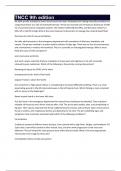
An adult pt who sustained a severe head trauma has been intubated and is being manually ventilated via a bag-mask device at a rate of 18 breaths/minute. The pt has received one intravenous fluid bolus of 500 mL of warmed isotonic crystalloid solution. the PaCO2 is 30mmHg (4.0 kPa), and the pulse oximetry is 92%. BP is 142/70 mmHg. What is the most important intervention to manage the cerebral blood flow? Decrease the rate of manual ventilation An older adult presents to the emergency depart...
- Package deal
- Exam (elaborations)
- • 10 pages's •
-
AQA•TNCC
-
TNCC EXAM 100% PASSED• Byjessyqueen
Preview 2 out of 10 pages
Getting your document ready...
An adult pt who sustained a severe head trauma has been intubated and is being manually ventilated via a bag-mask device at a rate of 18 breaths/minute. The pt has received one intravenous fluid bolus of 500 mL of warmed isotonic crystalloid solution. the PaCO2 is 30mmHg (4.0 kPa), and the pulse oximetry is 92%. BP is 142/70 mmHg. What is the most important intervention to manage the cerebral blood flow? Decrease the rate of manual ventilation An older adult presents to the emergency depart...

C What are the primary benefits of a team approach to trauma care - it provides a systemic approach to care and organizes care A In the primary survey AVPU is performed to determine if the patient can: - Protect their aiway B WHich may lead to unreliable pulse ox reading - carboxyhemoglobin A The systemic inflammatory response is a normal part of the body's response to shock from traumatic injury. what best describes this response - it is activated by tissue hypoxia and sends neutrophils ...
- Package deal
- Exam (elaborations)
- • 6 pages's •
-
AQA•TNCC
-
TNCC EXAM 100% PASSED• Byjessyqueen
Preview 2 out of 6 pages
Getting your document ready...
C What are the primary benefits of a team approach to trauma care - it provides a systemic approach to care and organizes care A In the primary survey AVPU is performed to determine if the patient can: - Protect their aiway B WHich may lead to unreliable pulse ox reading - carboxyhemoglobin A The systemic inflammatory response is a normal part of the body's response to shock from traumatic injury. what best describes this response - it is activated by tissue hypoxia and sends neutrophils ...
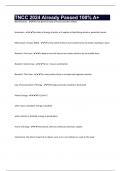
Biomechanics - is the general study of forces and their effects kinematics - the study of energy transfer as it applies to identifying actual or potential injuries Mechanism of Injury (MOI) - is how external forces are transferred to the body, resulting in injury Newton's First Law - a body at rest will stay at rest unless acted on by an outside force Newton's Second Law - Force = mass x acceleration Newton's Third Law - For every action there is an equal and opposite reaction Law of Co...
- Package deal
- Exam (elaborations)
- • 4 pages's •
-
AQA•TNCC
-
TNCC EXAM 100% PASSED• Byjessyqueen
Preview 1 out of 4 pages
Getting your document ready...
Biomechanics - is the general study of forces and their effects kinematics - the study of energy transfer as it applies to identifying actual or potential injuries Mechanism of Injury (MOI) - is how external forces are transferred to the body, resulting in injury Newton's First Law - a body at rest will stay at rest unless acted on by an outside force Newton's Second Law - Force = mass x acceleration Newton's Third Law - For every action there is an equal and opposite reaction Law of Co...
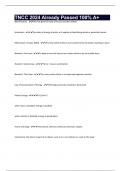
Biomechanics - is the general study of forces and their effects kinematics - the study of energy transfer as it applies to identifying actual or potential injuries Mechanism of Injury (MOI) - is how external forces are transferred to the body, resulting in injury Newton's First Law - a body at rest will stay at rest unless acted on by an outside force Newton's Second Law - Force = mass x acceleration Newton's Third Law - For every action there is an equal and opposite reaction Law of Co...
- Package deal
- Exam (elaborations)
- • 4 pages's •
-
AQA•TNCC
-
TNCC EXAM 100% PASSED• Byjessyqueen
Preview 1 out of 4 pages
Getting your document ready...
Biomechanics - is the general study of forces and their effects kinematics - the study of energy transfer as it applies to identifying actual or potential injuries Mechanism of Injury (MOI) - is how external forces are transferred to the body, resulting in injury Newton's First Law - a body at rest will stay at rest unless acted on by an outside force Newton's Second Law - Force = mass x acceleration Newton's Third Law - For every action there is an equal and opposite reaction Law of Co...
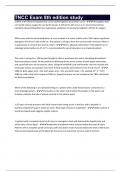
1.What is the effect of hypothermia on the oxyhemoglobin dissociation curve - Hemoglobin does not readily release oxygen for use by the tissues A shift to the left occurs in an environment of low metabolic demand (hypothermia, hypocapnia, alkalosis), increasing hemoglobin's affinity for oxygen. EMS arrives with the intoxicated driver of a car involved in a motor vehicle crash. EMS reports significant damage to the driver's side of the car. The patient is asking to have the cervical collar ...
- Package deal
- Exam (elaborations)
- • 9 pages's •
-
AQA•TNCC
-
TNCC EXAM 100% PASSED• Byjessyqueen
Preview 2 out of 9 pages
Getting your document ready...
1.What is the effect of hypothermia on the oxyhemoglobin dissociation curve - Hemoglobin does not readily release oxygen for use by the tissues A shift to the left occurs in an environment of low metabolic demand (hypothermia, hypocapnia, alkalosis), increasing hemoglobin's affinity for oxygen. EMS arrives with the intoxicated driver of a car involved in a motor vehicle crash. EMS reports significant damage to the driver's side of the car. The patient is asking to have the cervical collar ...
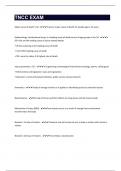
Major cause of death 1-44 - Trauma: major cause of death for people ages 1-44 years Epidemiology: Unintentional injury is a leading cause of death across all age groups in the US - • 65+ falls are the leading cause of injury-related deaths • 25-64: poisoning is the leading cause of death • 5-24: MVC leading cause of death • TBI: more for males, 0-4 highest rate of death Injury prevention: 3 E's - • Engineering: technological interventions (airbags, alarms, safety gear) • Enfo...
- Package deal
- Exam (elaborations)
- • 26 pages's •
-
AQA•TNCC
-
TNCC EXAM 100% PASSED• Byjessyqueen
Preview 3 out of 26 pages
Getting your document ready...
Major cause of death 1-44 - Trauma: major cause of death for people ages 1-44 years Epidemiology: Unintentional injury is a leading cause of death across all age groups in the US - • 65+ falls are the leading cause of injury-related deaths • 25-64: poisoning is the leading cause of death • 5-24: MVC leading cause of death • TBI: more for males, 0-4 highest rate of death Injury prevention: 3 E's - • Engineering: technological interventions (airbags, alarms, safety gear) • Enfo...

What is the key to a high performing trauma team? - x When obtaining a history for an injured patient, determing energy transfer through biochemical data help the nurse to: - x The major preventable cause of death in the trauma patient is: - x The across-the-room observation step in the inital assessment provides the opportunity to: - x Which of the following accurately describes ventilation principles associated with a bag-mask device? - x Which of the following is the best measure of th...
- Package deal
- Exam (elaborations)
- • 5 pages's •
-
AQA•TNCC
-
TNCC EXAM 100% PASSED• Byjessyqueen
Preview 2 out of 5 pages
Getting your document ready...
What is the key to a high performing trauma team? - x When obtaining a history for an injured patient, determing energy transfer through biochemical data help the nurse to: - x The major preventable cause of death in the trauma patient is: - x The across-the-room observation step in the inital assessment provides the opportunity to: - x Which of the following accurately describes ventilation principles associated with a bag-mask device? - x Which of the following is the best measure of th...

What is the key to a high performing trauma team? - Consistent communication (Communication, cooperation, and coordination are the foundations of successful teamwork in trauma care p.6) When obtaining a history for an injured patient, determining energy transfer through biomechanical data helps the nurse to: - Anticipate the types of injury that may be present (Mechanism of injury and energy transfer can help predict potential injuries and injury patterns p.29) The major preventable cause ...
- Package deal
- Exam (elaborations)
- • 4 pages's •
-
AQA•TNCC
-
TNCC EXAM 100% PASSED• Byjessyqueen
Preview 1 out of 4 pages
Getting your document ready...
What is the key to a high performing trauma team? - Consistent communication (Communication, cooperation, and coordination are the foundations of successful teamwork in trauma care p.6) When obtaining a history for an injured patient, determining energy transfer through biomechanical data helps the nurse to: - Anticipate the types of injury that may be present (Mechanism of injury and energy transfer can help predict potential injuries and injury patterns p.29) The major preventable cause ...

What is the key to a high performing trauma team? - Consistent communication (Communication, cooperation, and coordination are the foundations of successful teamwork in trauma care p.6) When obtaining a history for an injured patient, determining energy transfer through biomechanical data helps the nurse to: - Anticipate the types of injury that may be present (Mechanism of injury and energy transfer can help predict potential injuries and injury patterns p.29) The major preventable cause ...
- Package deal
- Exam (elaborations)
- • 4 pages's •
-
AQA•TNCC
-
TNCC EXAM 100% PASSED• Byjessyqueen
Preview 1 out of 4 pages
Getting your document ready...
What is the key to a high performing trauma team? - Consistent communication (Communication, cooperation, and coordination are the foundations of successful teamwork in trauma care p.6) When obtaining a history for an injured patient, determining energy transfer through biomechanical data helps the nurse to: - Anticipate the types of injury that may be present (Mechanism of injury and energy transfer can help predict potential injuries and injury patterns p.29) The major preventable cause ...
